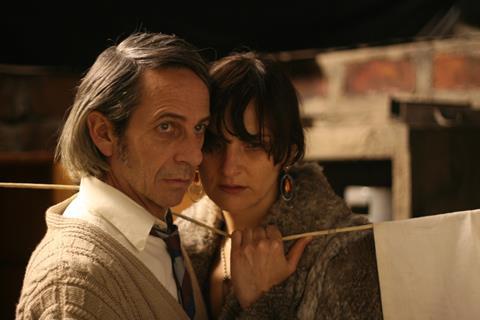Dir: Pablo Larrain. Chile-Mexico-Germany. 2010. 98mins

If, as director Pablo Lorrain implies in his introductory notes, his film’s main character stands for the Chilean silent majority at the time of the Pinochet coup, he evidently doesn’t nurse any great sympathy or admiration for his co-nationals. Once again exorcising a past that weighs heavy on him, though he was born three years after Allende’s demise, Larrain delivers a grim, unflattering portrait of a distasteful human being, probably even more unlikable than the non-hero of his previous in Tony Manero.
The plot insists on staying out of momentous events, which are implied but not shown.
This story about a particularly inexpressive morgue clerk and his affair with an anorexic dancer, going on - at least in his imagination - while the rest of the country is shaken to its foundations, turns out to be possibly more disagreeable than originally intended. But in all fairness, the divided opinions that will generate between those who will see it as justifiably harsh self-criticism and the rest, who will be put off by the unpleasantness of the characters and their story may open the doors to festival dates and specialised art house interest.
Inspired by a news item about a clerk who attended the autopsy of the late Chilean President Salvador Allende in order to type down the coroner’s report, Larrain weaved a plot around such a person and his conduct at the time.
Mario Conejo (Alfredo Castro) is a thin, glum, middle-aged lonely man with strict moral rules, his entire professional life unfolding between corpses, at the morgue. In his own mournful way, he fancies a burlesque dancer living across the street, Nancy (Zegers), who seems to cooperate for a while but is certainly not enthusiastic about the whole idea.
His attraction for her, however, has its limitations, when he hears Pinochet’s goons breaking into her house, arresting her father and brother and driving away in a hurry, he stays quietly in his corner. Once they are safely away, he goes over, rummages through the wreckage, picks up Nancy’s wounded dog and then finds Nancy herself hiding in a closet. In exchange for sexual services, which are never verbally requested but duly rendered, he brings her food, but only as long as he thinks she is hiding there by herself. Once he finds out the truth, the affair reaches its end.
Unraveling the metaphor is not that complicated. Mario, like so many others, may notice that things are happening around him, people are out in the street demonstrating, the police are descending on unsuspecting victims and brutalising them, corpses are piling up at the morgue, but he prefers to keep his distance, not voicing an opinion, not taking a stand, not participating in anything that might incur a risk, exclusively concerned only with his own person.
A colleague of his throws a fit and is almost shot dead when she raises her voice in protest at the Army’s conduct, while he watches silently. Nancy, who might be construed as the victim of the piece, has been brought up in a communist home but prefers nightlife vanities to any ideological stand. For lack of a better word, Mario’s “affair” with Nancy is as ill-fated as the future of Chile during those days, their egocentric indifference to anything that does not concern them directly, even the shape of her under-nourished body, are an integral part of the metaphor.
Cinematographer Sergio Armstrong shot the entire film in 16mm widescreen blown up later to 35mm, with colour mostly drained out to leave a kind of grainy uncomfortable image, enveloping everything in a gray, downbeat light, his framing decisions, cutting off images at the most unlikely places, either incredibly or purposely negligent. The plot insists on staying out of momentous events, which are implied but not shown, and Larrain, going back for his Tony Manero lead, Alfredo Castro, allows him no visible emotion at all, even when he is supposed to be eager or excited about something, which he rarely is.
Production companies: Fabula (Chile)
Producer: Juan de Dios Larrain
International sales: Funny Balloons, wwwfunny-ballons.com
Screenplay: Pablo Larrain, Matteo Iribarren
Cinematography: Sergio Armstrong
Production design: Polin Garbisu
Editing: Andrea Chignoli
Main cast: Alfredo Castro, Antonia Zegers, Jaime Vadell, Amparo Noguera, Marcelo Alonso, Marcial Tagel






![The Brightest SunScreen[Courtesy HKIFF]](https://d1nslcd7m2225b.cloudfront.net/Pictures/274x183/3/5/0/1448350_thebrightestsunscreencourtesyhkiff_312678.jpg)














